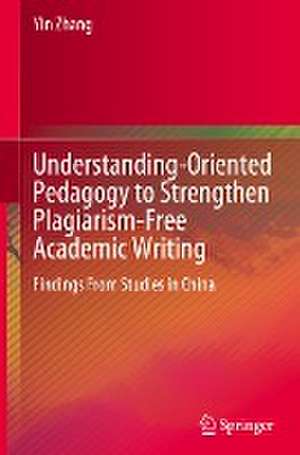Understanding-Oriented Pedagogy to Strengthen Plagiarism-Free Academic Writing: Findings From Studies in China
Autor Yin Zhangen Limba Engleză Hardback – 22 feb 2024
This book also contributes to the discussion about the validity of current plagiarism assessment scales by providing evidences to challenge them and proposing a new one. This book is of great benefits for readers to increase knowledge and promote positive attitudes toward plagiarism and plagiarism instruction. It adds to our knowledge of how plagiarism in higher education can be effectively prevented by adopting an understanding-oriented pedagogy. It also adds to our knowledge of how Chinese undergraduates and their instructors view plagiarism and cope with plagiarism in discipline-based courses, which provides robust evidence for the academic debate about whether culture has effects on students’ plagiarism in academic writing. Finally, it provides insights about the relationship among plagiarism, pedagogy, and technology.
Preț: 781.15 lei
Preț vechi: 952.61 lei
-18% Nou
Puncte Express: 1172
Preț estimativ în valută:
149.52€ • 162.47$ • 125.68£
149.52€ • 162.47$ • 125.68£
Carte tipărită la comandă
Livrare economică 21 aprilie-05 mai
Preluare comenzi: 021 569.72.76
Specificații
ISBN-13: 9789819998432
ISBN-10: 9819998433
Pagini: 160
Ilustrații: IX, 160 p. 12 illus., 9 illus. in color.
Dimensiuni: 155 x 235 mm
Greutate: 0.42 kg
Ediția:2024
Editura: Springer Nature Singapore
Colecția Springer
Locul publicării:Singapore, Singapore
ISBN-10: 9819998433
Pagini: 160
Ilustrații: IX, 160 p. 12 illus., 9 illus. in color.
Dimensiuni: 155 x 235 mm
Greutate: 0.42 kg
Ediția:2024
Editura: Springer Nature Singapore
Colecția Springer
Locul publicării:Singapore, Singapore
Cuprins
Chapter 1. Introduction.- Chapter 2. Plagiarism issues in higher education.- Chapter 3. Teaching to avoid plagiarism in academic writing.- Chapter 4. Design of an understanding-oriented pedagogy.- Chapter 5. Design of an ICT tool: the online writing system.- Chapter 6. Invigorating the understanding-oriented pedagogy through practice.- Chapter 7. The effects of the pedagogical intervention on students’ plagiarism.- Chapter 8. Key points derived from the research findings.- Chapter 9. Conclusion: future directions for the understanding-oriented pedagogy.- Appendices.
Notă biografică
Dr. Zhang Yin is Associate Professor in the Department of Education, Ocean University of China. She obtained a Ph.D. in Education from The University of Hong Kong, Faculty of Education. Her research interests lie in the areas of digital literacies, anti-plagiarism literacy, social media in education, and ICT-supported teaching and learning. She has been involved in 30 research projects, with 19 projects serving as the Principal Investigator.
She has published over 35 articles with 13 appearing in international academic journals. This includes key journals in the field of educational technology, such as The Internet and Higher Education, and British Journal of Educational Technology. She has received a number of awards, including Shandong Province Social Science Excellent Achievement Prize and Qingdao Social Science Excellent Achievement Prize.
She has published over 35 articles with 13 appearing in international academic journals. This includes key journals in the field of educational technology, such as The Internet and Higher Education, and British Journal of Educational Technology. She has received a number of awards, including Shandong Province Social Science Excellent Achievement Prize and Qingdao Social Science Excellent Achievement Prize.
Textul de pe ultima copertă
This book discusses the plagiarism-free academic writing in higher education. It demonstrates how to orchestrate an understanding-oriented pedagogy (including the teaching of plagiarism and source use) in order to facilitate plagiarism-free academic writing among undergraduates by revealing studies in China. This book emphasizes that plagiarism is a mere symptom of educational problems and plagiarism urgently needs education-based solutions instead of punish solutions. It highlights that students' meaningful understandings of plagiarism and source use should be identified as the main learning objectives of plagiarism instruction, as well as features the adoption of plagiarism instruction in academic writing practices in subject courses. It also focuses on the potentials of Information and Communication Technology (ICT) in scaffolding learning and teaching under plagiarism pedagogy beyond merely detecting plagiarism.
This book also contributes to the discussion about the validity of current plagiarism assessment scales by providing evidences to challenge them and proposing a new one. This book is of great benefits for readers to increase knowledge and promote positive attitudes toward plagiarism and plagiarism instruction. It adds to our knowledge of how plagiarism in higher education can be effectively prevented by adopting an understanding-oriented pedagogy. It also adds to our knowledge of how Chinese undergraduates and their instructors view plagiarism and cope with plagiarism in discipline-based courses, which provides robust evidence for the academic debate about whether culture has effects on students’ plagiarism in academic writing. Finally, it provides insights about the relationship among plagiarism, pedagogy, and technology.
This book also contributes to the discussion about the validity of current plagiarism assessment scales by providing evidences to challenge them and proposing a new one. This book is of great benefits for readers to increase knowledge and promote positive attitudes toward plagiarism and plagiarism instruction. It adds to our knowledge of how plagiarism in higher education can be effectively prevented by adopting an understanding-oriented pedagogy. It also adds to our knowledge of how Chinese undergraduates and their instructors view plagiarism and cope with plagiarism in discipline-based courses, which provides robust evidence for the academic debate about whether culture has effects on students’ plagiarism in academic writing. Finally, it provides insights about the relationship among plagiarism, pedagogy, and technology.
Caracteristici
Includes essential information about how to develop an ICT tool to support students’ plagiarism-free academic writing Provides accurate evaluations on the extents of plagiarism in writings and to faithfully reflect writing quality Helps the readers to conduct plagiarism instruction in class with the understanding-oriented pedagogy
